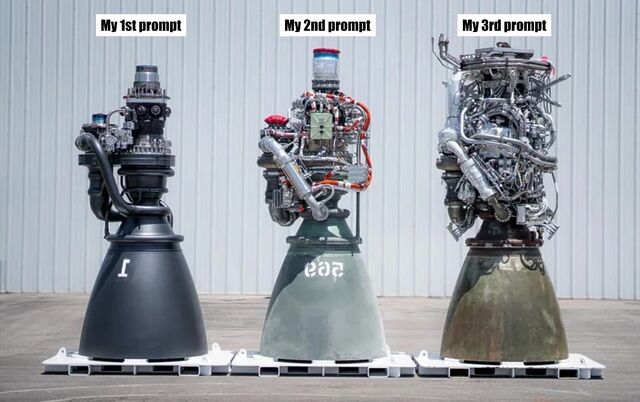…
Solving problems with LLMs is like solving front-end problems with NPM: the “solution” comes through installing more and more things — adding more and more context, i.e. more and more packages.
- LLM: Problem? Add more context.
- NPM: Problem? There’s a package for that.
…
As I’m typing this, I’m thinking of that image of the evolution of the Raptor engine, where it evolved in simplicity:
This stands in contrast to my working with LLMs, which often wants more and more context from me to get to a generative solution:
…
Jim Nielsen speaks to my experience, here. Because a programming LLM is simply taking inputs (all of your code, plus your prompt), transforming it through statistical analysis, and then producing an output (replacement code), it struggles with refactoring for simplicity unless very-carefully controlled. “Vibe coding” is very much an exercise in adding hacks upon hacks… like the increasingly-ludicrous epicycles introduced by proponents of geocentrism in its final centuries before the heliocentric model became fully accepted.

I don’t think that AIs are useless as a coding tool, and I’ve successfully used them to good effect on several occasions. I’ve even tried “vibe coding”, about which I fully agree with ‘s observation that “vibe code is legacy code”. Being able to knock out something temporary, throwaway, experimental, or for personal use only… while I work on something else… is pretty liberating.
For example: I couldn’t remember my Google Sheets API and didn’t want to re-learn it from the sprawling documentation site, but wanted a quick personal tool to manipulate such a sheet from a remote system. I was able to have an AI knock up what I needed while I cooked dinner for the kids, paying only enough attention to check-in on its work. Is it accessible? Is it secure? Is it performant? Is it maintainable? I can’t answer any of those questions, and so as a professional software engineer I have to reasonably assume the answer to all of them is “no”. But its only user is me, it does what I needed it to do, and I didn’t have to shift my focus from supervising children and a pan in order to throw it together!
Anyway: Jim hits the nail on the head here, as he so often does.

